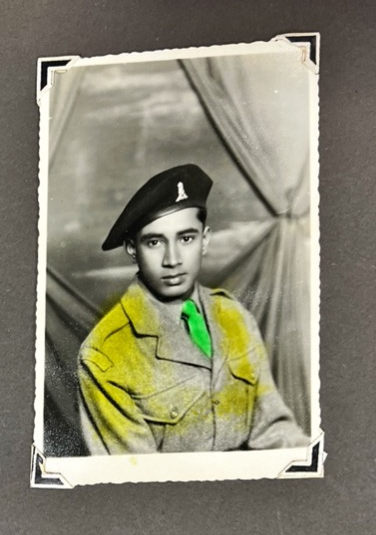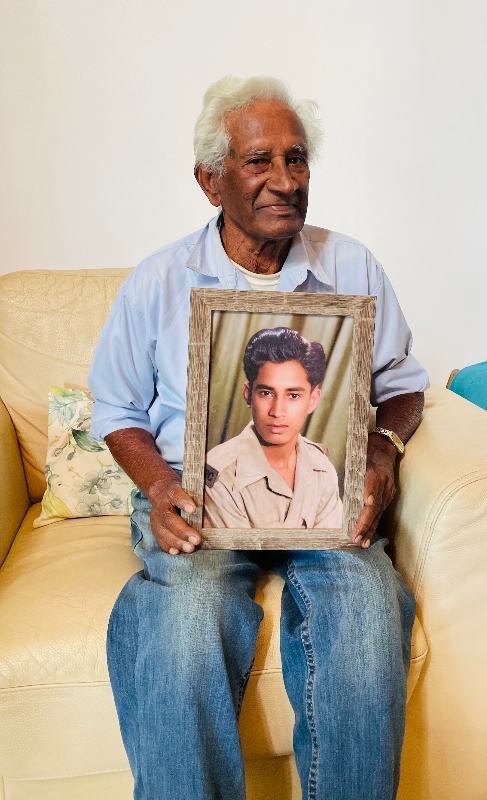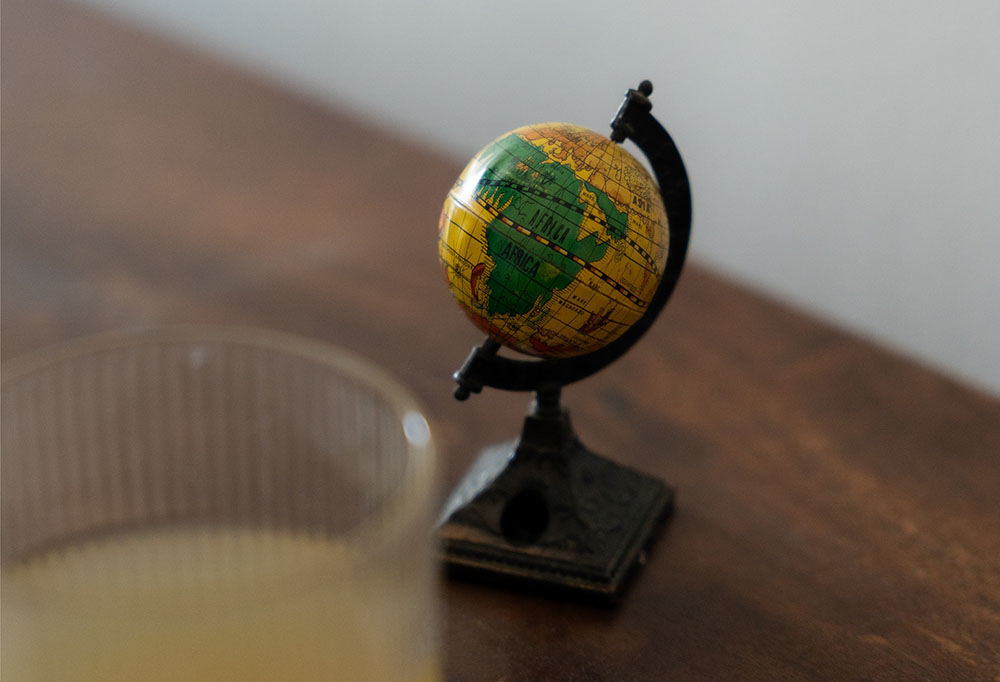“Mawsi, Babooa aal?” (Mawsi, has your son come back?)
“Nai beta, nai aal baa.” (No dear, he has not)
“Ta nai esperer kara. Ou angle ke larme mein chal gal!” (Then don’t wait for him. He has joined the British army!)
This is how my mother learnt of my recruitment into the British army. Basdeo, my neighbour, informed her after I had left home, suddenly and without warning one random weekday afternoon.
It was 13 March 1951. I was seventeen, stuck in a rut that demanded too much from the eldest son of a fatherless family. Just the previous year, I had married off my fifteen-year-old sister. There was still my younger brother’s education to take care of. And good matches to be found for my other sisters. All of this, while trying to get by on the meagre earnings of an apprentice carpenter—one who served not the white colonials and the bourgeoisie of Réduit or Port Louis, but the more tight-fisted planters and daily wage workers who lived in our neighbourhood, the unglamourous area of Karo Laliane in Vacoas.
I felt trapped.
Until a conversation with Dharam Bhaiyya let in a tiny ray of hope.
Dharam Bhaiyya, my cousin, was my hero. I had grown up hearing his tales of derring-do, of wartime heroism. He had gone off to fight for the British during the Second World War—along with some thirty-five thousand other young men and women from Mauritius. Because Mauritius was a Crown Colony ruled by a British governor, its people could sometimes be conscripted into the British army, and several hundred indeed were, during the First and Second World Wars.
However, several others went willingly. Dharam Bhaiyya did. He signed himself up, pocketing his salary of eighty-nine cents per day, and was gone for five or six years. When he came back, he was thin as a rake and looked older than his twenty-four years. But he also exuded adventure and wisdom. What had he not seen! He had been Armed Guard in Nuseirat, Palestine, where he had to watch over stores of ammunition and army supplies and fend off the locals who would try to steal the ammunition for their own ongoing revolt. (“They would crawl for miles, in the dark of the night, Babooa! You could barely detect them—until they were directly in front of you! Enfin, they also had their own grouse against the British”). He had learned to use all kinds of guns and would enthral us with their names and descriptions: Thompson submachine gun for close combat; the semi-automatic M1 Carbine gun, which was small and lightweight but powerful enough to use in live war. A couple of years into service, with the onset of the Italian Campaign in 1943, he was transferred to the 8th army and posted to Florence, Italy, where he retrained as a Military Driver. There, he whizzed through war zones to transport troops, ammunition and sustenance to soldiers on the ground, while war raged all around him. He celebrated with his company when news spread that the Germans in northern Italy had finally capitulated in May 1945, signalling the end of the war!
But this was 1951. A time of peace. The British Empire still ruled over us, albeit with a less metallic fist. We, the descendants of coolies and slaves, could now own land, had access to schools, and had rights that had been denied to the generations who came before us—including being eligible for the Legislative Council (provided we were able to sign our names in any of the languages spoken on the island). There had been a Labour Party in place since 1936 to protect the rights and freedoms of workers and support fair wages. In theory at least, life was easier for us—if we ignored the very real economic deprivations that we faced. While we could own land, it was the white Franco-Mauritians who held the keys to all industries and businesses, including the one thing that the entire Mauritian economy rested on: sugar. Any other ethnicity could only have very limited access to this tightly monitored circle of elites. Overpopulation and widespread unemployment had led to housing, health and education crises. Dozens of children were born to each family, many of whom did not make it to adulthood due to poor access to healthcare. And cyclones continued to wreak havoc on our lives yearly, devastating whatever infrastructure we owned, along with our crops, and leaving in their wake food shortages and malnutrition, as well as all kinds of diseases, such as malaria, dengue fever, scabies and tuberculosis.
It is of these desolations that I was speaking to Dharam Bhaiyya when he mentioned that the British army was still recruiting. He had heard that soldiers were now being sent up the coast of Africa—but he did not know the details. Where? What? Why? But this was enough information for me. I needed to get out, and perhaps I had found a way.
So, one fine morning, without telling anyone, I made my way to Garrison Hall, where the recruitment process was happening.
There were twenty-seven other people in the room that day, all looking as nervous as I felt. A doctor, British, examined us from head to toe. Open your mouth. Stick your tongue out. Lift your arms. Squat. SQUAT! Now jump. Bend over. In between, we waited, too afraid to ask questions, too afraid to move, in case we were chastised.
Basdeo Seebaluck, my neighbour, was walking by, on his way to an errand. He saw me in the hall.
“Eh, to hiyan ka kara thwe?” (Hey, what are you doing here?)
“Hamar maa ke boliye, je ham chhaw baje tak ghare nai aini, ta ham larme mein chal gayni . . . ” (Tell my mother, if I am not back home by six o’clock, then I have gone off into the army . . . )
And so it was that Basdeo duly went to check on me at six o’clock that afternoon. And how my mother found out that I was now on the path to becoming Private Goordial Seeraz (18087543) of the Royal Pioneer Corps.
I would see her again before I was sent off on my mission. A few weeks after my recruitment, I would go back home, with ten rupees in my pocket from my training camp at Le Chaland in the south of the island—then a couple of hour’s bus journey away from home. My mother would try to sneak me away. Run away, she said. Don’t go back!
Run where? The British are everywhere! I have nowhere to run! And what would I do here anyway?
Still, she sneaked me off to her relatives in the north of the island. She was petrified at the thought of her child going off to who-knows-where, to do who-knows-what! Had the two world wars not taken enough sons away? Broken the spirits and families of so many others? Did they now need to give up their lives in a time of peace too? But I was aware of the consequences of evading the British army. I would be court-martialled. Besides, there was the salary that the British had promised me, including the pocket money of ten rupees each week. Ten rupees! It would help me and my family get by—and well! So, I went back to my training camp to prepare for my departure, despite my mother’s loud protests.
The next time I would see my mother, she would not see me. She came to bid me goodbye at the harbour, as I left with my company on 10 May 1951. But she was late. I had already boarded the Empire Ken. The trip from Vacoas to Port Louis was not as smooth then as it is now. Multiple bus changes were involved, each with unpredictable timetables. By the time she arrived at the harbour, I was already on the ship, indistinguishable from everyone else on board in my new uniform. She ran along the dock scrutinizing the one thousand eight hundred faces, trying to catch a glimpse of me. My last image of her, as the ship pulled away, was of her tripping and falling, even as her eyes darted frantically all over the receding ship, in a desperate attempt to have a last look at my face.
The Voyage and Port Said
Between 1951 and 1954, I was posted in Egypt.
The trip from Mauritius to Port Said, situated at the northern mouth of the Suez Canal, had lasted seventeen days, with multiple stops at Mombasa, the Port of Aden, Port Sudan, and finally through the Suez Canal to Port Said. Some of the soldiers on the ship were returning to duty after holidays in Mauritius, and they acted as our guides and mentors:
“This side leads to Egypt,” they would point, as we approached the Gulf of Suez from the Red Sea. “If you took the other channel, the Gulf of Aqaba, you would end up in Palestine.”
“Thousands of Mauritians have been serving here in Egypt since the end of the war.”
“When we disembark at Port Said, we will board a lighter and make our way to Kibrit Air Base.”
“The weather is going to be torturous. Brace yourself.”
“It will take you a while to get used to the food that we get served here. While delicious, it is not like the food we eat at home. Some days, we get lucky, and we have a Mauritian cook.”
“There is a lot of tension between the Egyptians and the British army. War is not unlikely.”
“Here, you will meet people from Seychelles, Rodrigues Island, and all over East Africa. We are all friends here.”
“The British mostly keep to themselves and do not mix with the soldiers from the colonies.”
“When we’re off duty, we watch movies together. We sometimes have an open-air cinema for viewing films. Last time, we watched Escape and Samson and Delilah. The actress, Hedy Lamarr, is so beautiful!”
By the time we reached Kabrit, three things were clear to me:
1. My success in the army depended on completing my training and heeding my commanders.
2. Asking too many questions about our purpose and the point of being here was not part of the expectations and would not help me rise in the ranks.
3. While there was no chance on Earth of ever confusing me with being British or white in Mauritius, here, I was very much British and a representative of the British army. Thousands of other Mauritians, Seychellois, East Africans and Indians were British like me too. Internally and within the army, we were still not the same as the white British soldiers, but to the locals, we stood for the same thing.
By and large, my time in the army was not as unpleasant as I feared it might have been. Yes, the work was excruciatingly hard—with exacting British officers who, it turns out, were more frightful than the Egyptians we were guarding against. (Just how fearful the British officers were became clear one day when fellow Mauritian Luk-Tong was leading the drill commands. Upon seeing the British officer walk in, he was so scared that he lost all his English. His brain refused to spit out the command “ABOUT TURN.” Instead, he shouted out “ASTER VIRÉ” in Kreol, to the amusement of all the Mauritians, and bemusement of everyone else.) We conducted drills and physical training which included handling ammunition and crawling with our full kit bags on our backs in the sweltering heat, followed by shifts of over twelve hours. I was Armed Guard, so I was literally on my feet for most of the day. In the week that I landed, one of the vaccines that I was administered paralysed my entire arm, leading to me having to spend three days at the army hospital in Tel El Kebir. This was no life of ease and relaxation.
And yet, there were times when I felt . . . happy. I had made friends from places I had not even heard about before I left Mauritius. Together, we talked about our homes, but also bonded over our mutual love for movies and movie stars! Several of us became dedicated fans of Adele Mara, Esther Williams, Joan Collins and Dorothy Lamour. We wrote fanmail to them on postcards, and collected their photos in our albums. Once, King George visited us, in secret. We were all so dazzled to be in the presence of the one who ruled over us, and even more taken aback when he thanked us for our services. Thanked US! My mother never believed me when I wrote about this to her in a letter. A year later, when King George passed away and Elizabeth ascended the throne, we conducted a parade at the exact time that the coronation was taking place in London. That day, we all ate cake, in honour of our new queen.
After about a year of service, I finally earned a fourteen-day holiday. It was too short a time to take a trip back to Mauritius, so I opted for a sojourn in Cyprus instead. Three friends and I left for Famagusta towards late 1952, where we intended to stay in one of the British camps for just over a week. We would not be back in Egypt until 1953. War had broken out in Egypt. Though the ire was directed at their monarch, King Farouk (who was toppled and replaced by Mohamed Naguib of the Free Officers Movement) it also became clear to me, over the next few months, that the grievances were also directed at the British occupation of Egypt, which had been ongoing since the British invaded Egypt in 1882. People were protesting the British presence and domination (including their control over the Suez Canal) in a land that was not theirs. This was my first encounter with any kind of nationalist movement, and I was awed by the possibility of rebellion against the mighty British.
With time, I also started understanding what role we—the colonial subjects from Mauritius, Seychelles and East Africa etc.—were playing, merely through our presence as representatives of the British at Port Said. The British government co-owned the Suez Canal Company, which had overseen all operations of the canal since 1875, when it had bought over the shares from Egypt’s then-ruler, Ismail Pasha. The other half of the shares were held by French investors (including the architect of the canal, Ferdinand de Lesseps). But following the First and Second World Wars, the control of the Suez was even more crucial for the British, given the Suez’s importance as a trade route, its geographic significance in maintaining access to Britain’s colonies across Asia, Africa and the Indian Ocean, and its proximity to valuable stores of oil. There was too much at stake for the British. The British military presence—manned by all of us from the colonies—thus sought to keep the Egyptian nationalists at bay, especially since the nationalists were now also activating to revoke the concession that the Egyptian rulers had granted to the Suez Company, handing over its control. We, in effect, were there not to “protect” the canal, but to ward off Egyptians in Egypt against compromising British interests. The same British who occupied our lands, too.
Lest We Forget
When I (the author) met him, Goordial was already in his seventies. Self-effacing and reluctant to draw too much attention to himself, he would only bloom when one of two things happened: when he had a drink, and when he spoke of his time in Egypt.
One evening, after he had clearly had a few glasses, I found him huddled over something in a corner of his room. What are you doing, Nana? I asked.
He was sheepish—almost like he had been caught doing something he should not have. He put his hands over the stack that he was holding. I noticed that he was clutching felt pens. Probably borrowed from his granddaughter’s pencil case. I asked if I could see what he was drawing. Hesitantly—almost as though he was worried about judgement—he lifted his hands to show me. It was his photo album, gnawed in places by termites, which contained multiple photographs, letters, postcards and news clippings. It was all from his time in Egypt.
He had been colouring one of the photos. It was a black and white headshot of him.. He had his Royal Pioneer Corps beret, a tie and his military uniform on. With a green felt pen, Goordial had painted his tie green. He was now working on the uniform, with a cloudy yellow colour.
“I was trying to paint these black and white photos in the colours that I remember. With time you forget, you know . . . ”
“Why did you come back, Nana?” I asked, flipping through the album.
“How long can you fight a war that’s not yours? Besides, I missed my mother.”

The photograph that Goordial was colouring with felt pens.

Goordial, aged eighty-nine, with his first ever military headshot, aged seventeen. The old photo is colorized.

